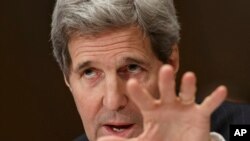U.S. Secretary of State John Kerry on Tuesday called the threat posed by Islamic State and violent extremism “the challenge of a generation,” as he presented his case to a Senate panel for funding to carry out the Obama administration’s foreign policy.
The nation’s top diplomat told the Senate Appropriations Committee that brutal extremist groups like Islamic State represent “a horrendous step backwards in the context of the world’s march toward civility and the rule of law.”
The State Department is seeking $3.5 billion to counter Islamic State in Iraq and Syria, to bolster regional security and provide humanitarian aid to those in the region. However, the threat, he added, extends beyond the group to all violent extremists, and it will take a comprehensive strategy to eliminate it.
“They have threatened the world with their vision of how they want to live and how they want to impose their life on other people,” said Kerry. “They destroy schools, they destroy books, they rape young girls, they sell people into slavery, they cut off heads in public, they burn people alive.”
Obama administration officials last week hosted a summit on countering violent extremism that brought together more than 60 nations and community and religious leaders from around the world. President Barack Obama called on nations to address core issues that may create an environment ripe for extremism, such as poor governance, oppression, poverty, and lack of jobs, education and opportunity.
On Tuesday, Republican Sen. Steve Daines of Montana suggested the “root cause” of violent extremism “is more than jobs and governance, but comes back to ideology.”
Kerry answered, “Well, it is, but why does somebody fall prey to that ideology? Why does somebody think going and cutting off somebody’s head is a good idea?"
The secretary of state said his department’s funding request before Congress includes financing for social media and other efforts to counter sophisticated and effective propaganda being distributed by Islamic State through YouTube, Twitter, Facebook and other venues to lure more recruits.
“There’s no one-size-fits-all shoe that’s going to solve this. It has to be a holistic approach,” Kerry told the panel.
“We have to step up and do more, and we have to view it holistically, and we have to understand it’s a whole bunch of things. And if we work at it holistically, we’re going to win,” Kerry continued. “And if we make the wrong judgments, though, about what is going to make a difference, then we’re going to take a lot longer to do what we need to do.”
In addition, Kerry said, funding will pay for continuing military efforts to combat terrorists in Iraq and Syria. So far, that has included 2,500 airstrikes to help partners on the ground push back militants and retake territory, like the northern Syrian town of Kobani, taken back by Kurdish fighters in January.
The diplomat said the U.S. is leading in the fight against violent extremism but it needs more resources to carry out its goal. “The simple fact is we cannot lead, we cannot do what we need to do in the world, on the cheap,” he said.




